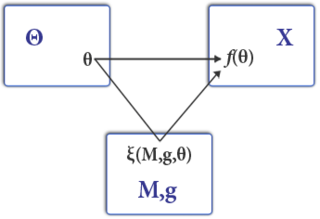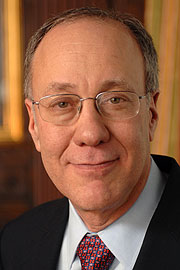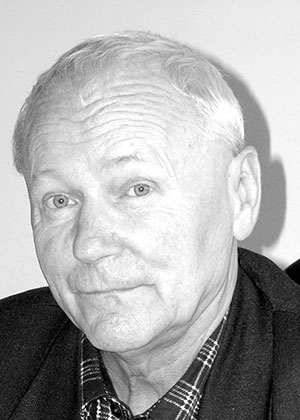A planned economy is a type of economic system where the distribution of goods and services or the investment, production and the allocation of capital goods takes place according to economic plans that are either economy-wide or limited to a category of goods and services. A planned economy may use centralized, decentralized, participatory or Soviet-type forms of economic planning. The level of centralization or decentralization in decision-making and participation depends on the specific type of planning mechanism employed.
Decentralization or decentralisation is the process by which the activities of an organization, particularly those regarding planning and decision making, are distributed or delegated away from a central, authoritative location or group.
Efficiency is the often measurable ability to avoid wasting materials, energy, efforts, money, and time in doing something or in producing a desired result. In a more general sense, it is the ability to do things well, successfully, and without waste.

Mechanism design is a field in economics and game theory that takes an objectives-first approach to designing economic mechanisms or incentives, toward desired objectives, in strategic settings, where players act rationally. Because it starts at the end of the game, then goes backwards, it is also called reverse game theory. It has broad applications, from economics and politics in such fields as market design, auction theory and social choice theory to networked-systems.

Science Commons (SC) was a Creative Commons project for designing strategies and tools for faster, more efficient web-enabled scientific research. The organization's goals were to identify unnecessary barriers to research, craft policy guidelines and legal agreements to lower those barriers, and develop technology to make research data and materials easier to find and use. Its overarching goal was to speed the translation of data into discovery and thereby the value of research.

A decentralised system in systems theory is a system in which lower level components operate on local information to accomplish global goals. The global pattern of behaviour is an emergent property of dynamical mechanisms that act upon local components, such as indirect communication, rather than the result of a central ordering influence of a centralised system.

Organizational architecture has two very different meanings. In one sense it literally refers to the organization's built environment and in another sense it refers to architecture metaphorically, as a structure which fleshes out the organizations. The various features of a business's organizational architecture has to be internally consistent in strategy, architecture and competitive environment.
Economic planning is a resource allocation mechanism based on a computational procedure for solving a constrained maximization problem with an iterative process for obtaining its solution. Planning is a mechanism for the allocation of resources between and within organizations contrasted with the market mechanism. As an allocation mechanism for socialism, economic planning replaces factor markets with a procedure for direct allocations of resources within an interconnected group of socially owned organizations which together comprise the productive apparatus of the economy.
The following outline is provided as an overview of and topical guide to management:

Leonid Hurwicz was a Polish-American economist and mathematician, known for his work in game theory and mechanism design. He originated the concept of incentive compatibility, and showed how desired outcomes can be achieved by using incentive compatible mechanism design. Hurwicz shared the 2007 Nobel Memorial Prize in Economic Sciences for his seminal work on mechanism design. Hurwicz was one of the oldest Nobel Laureates, having received the prize at the age of 90.
Control is a function of management which helps to check errors in order to take corrective actions. This is done to minimize deviation from standards and ensure that the stated goals of the organization are achieved in a desired manner.
Market engineering comprises the structured, systematic and theoretically founded procedure of analyzing, designing, introducing and also quality assuring of markets as well as their legal framework regarding simultaneously their market mechanisms and trading rules, systems, platforms and media, and their business models. In this context, term market stands for a set of rules defining the exchange of information between participants to conduct transactions at minimized cost. Market Engineering borrows concepts and methods from Economics, particularly, Game Theory, and Mechanism Design concepts, but also borrows concepts from Finance, Information Systems and Operations Research. It finds particular application in the context of electronic market platforms.

Roger Bruce Myerson is an American economist and professor at the University of Chicago. He holds the title of the David L. Pearson Distinguished Service Professor of Global Conflict Studies at The Pearson Institute for the Study and Resolution of Global Conflicts in the Harris School of Public Policy, the Griffin Department of Economics, and the college. Previously, he held the title The Glen A. Lloyd Distinguished Service Professor of Economics. In 2007, he was the winner of the Sveriges Riksbank Prize in Economic Sciences in Memory of Alfred Nobel with Leonid Hurwicz and Eric Maskin for "having laid the foundations of mechanism design theory." He was elected a Member of the American Philosophical Society in 2019.
Stanley Reiter was an American author, economist, and Emeritus Professor at Northwestern University. Reiter was a leading pioneer in the field of mechanism design.

Entity-level controls are controls that help to ensure that management directives pertaining to the entire entity are carried out. They are the second level of a to understanding the risks of an organization. Generally, entity refers to the entire company.
A distributed operating system is system software over a collection of independent software, networked, communicating, and physically separate computational nodes. They handle jobs which are serviced by multiple CPUs. Each individual node holds a specific software subset of the global aggregate operating system. Each subset is a composite of two distinct service provisioners. The first is a ubiquitous minimal kernel, or microkernel, that directly controls that node's hardware. Second is a higher-level collection of system management components that coordinate the node's individual and collaborative activities. These components abstract microkernel functions and support user applications.
Incentive-centered design (ICD) is the science of designing a system or institution according to the alignment of individual and user incentives with the goals of the system. Using incentive-centered design, system designers can observe systematic and predictable tendencies in users in response to motivators to provide or manage incentives to induce a greater amount and more valuable participation. ICD is often considered when designing a system to induce desirable behaviors from users, such as participation and cooperation. It draws from principles in various areas such as economics, psychology, sociology, design, and engineering. ICD has been gaining attention in research communities due to the role it can play in helping systems benefit their users and ultimately achieve better results.

The Heller-Hurwicz Economics Institute was launched in 2010 in order to promote socioeconomic research.
The socialist calculation debate, sometimes known as the economic calculation debate, was a discourse on the subject of how a socialist economy would perform economic calculation given the absence of the law of value, money, financial prices for capital goods and private ownership of the means of production. More specifically, the debate was centered on the application of economic planning for the allocation of the means of production as a substitute for capital markets and whether or not such an arrangement would be superior to capitalism in terms of efficiency and productivity.

Vladimir Nikolaevich Burkov is a Russian control theorist and the author of more than four hundred publications on control problems, game theory, and combinatorial optimization. Laureate of State Prize of USSR, of Prize of Cabinet Council of USSR, he is an Honoured Scholar of the Russian Federation. Vladimir Burkov is a vice-president of Russian Project Management Association (SOVNET), Member of Russian Academy of Natural Sciences. A professor at Moscow Institute of Physics and Technology and Head of Laboratory at V.A. Trapeznikov Institute of Control Sciences of RAS, in the end of the 1960s he pioneered the theory of active systems.









